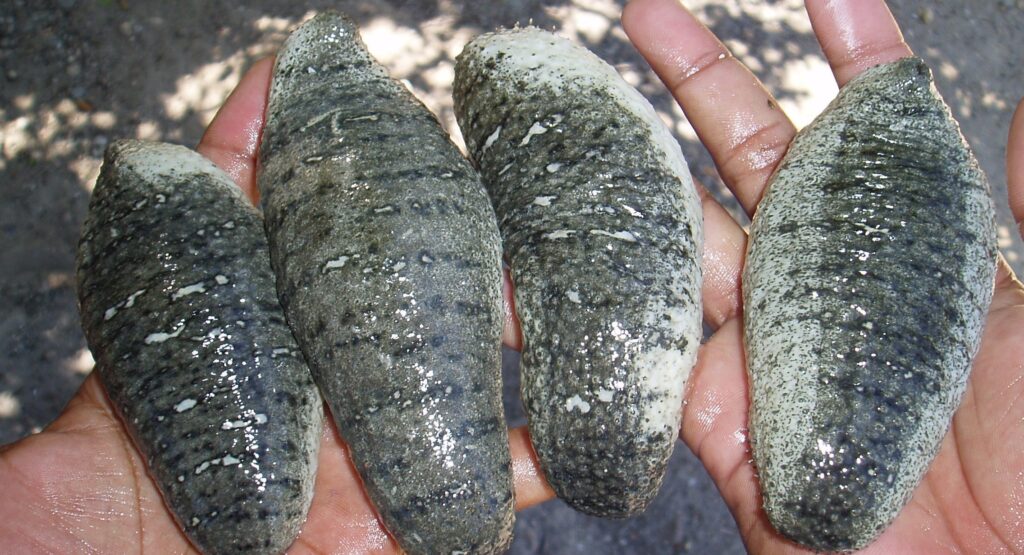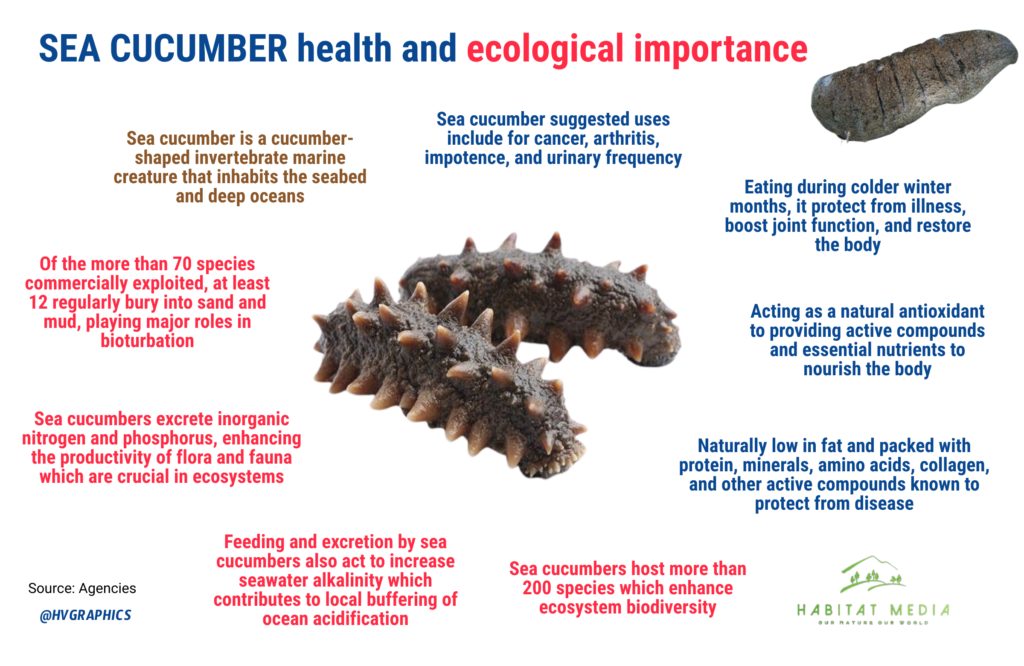By Haika Kimaro
Mtwara/Lindi. Many Tanzanians are not aware of a sea creature known as sea cucumber. But the fact is that it is a marine animal which affects the lives of many people. It is also one of the endangered species in the world. Its existence is threatened by climate change among other things.
But, despite their low profile among many Tanzanians, sea cucumber has the potential of transforming the lives of many people economically. Those who have been farming sea cucumbers have good tales to share.
Apart from earning a farmer some money, sea cucumbers are also important in keeping the marine environment safe. This is so important at this time when pressure from climate change has been on the increase.
In general, sea cucumber is one of the most important products in the blue economy. In addition to providing employment to many people, sea cucumber is also used as a food and a major source of nutrition. Because of their demand globally, sea cucumber can be one of major export products if its farming is taken seriously.
Low production cost.
One might think that farming sea cucumbers is expensive. But in fact what is required is construction of a cage and purchase of its chicks.
According to available market information, a kilo of sea cucumber is sold at between Sh150,000 and Sh350,000 depending on its quality. Name any one crop which fetches this price in the country!
If you count the production value chain of the sea cucumber you will realize that the product has high economic potential.
Talking to this paper, a chairman of Kaole Group, which has decided to engage in sea cucumber farming in Bagamoyo, Ibrahim Yusuph, says they started farming sea cucumber in 2020 and they have managed to raise 200,000 sea cucumbers so far.
“We are expecting to harvest them in November this year and it is our hope that we will have a good harvest,” he says.
He said he developed the idea of engaging in sea cucumber farming when serving as seaman in fishing trawlers.
“Sea cucumber farming is a very lucrative activity if you follow the requirements. So, when I left my earlier job I came back and asked some of my colleagues why we should not team up for sea cucumber farming and they agreed after I showed them how profitable the undertaking is.
“In 2020 we started but in the first season production was low given our inexperience. In the following two years we harvested 660 kilograms. It is our hope that our harvests will increase as we continue to improve the farming,” he says.
He says the government has set Sh180,000 as an indicative price for a kilo of sea cucumber. He says this price is not too bad as it covers their production costs.
“We have also started selling sea cucumber chicks to new people who have decided to engage in this activity. One chick goes at Sh400,” he elaborates.
A sea cucumber farmer from Somanga in Kilwa district, Lindi Region, Ally Machalila, says he started sea cucumber farming after receiving training at the Fisheries Education and Training Agency (FETA) earlier this year.
“After the training I saw the opportunity from sea cucumber farming, I decided to encourage some of my colleagues including Somanga Woman Group, who agreed with me. We are now in the final stages starting sea cucumber farming after we obtained the area for our first farm. We have planned to start with 20,000 sea cucumbers,” he says.
According to Machalila, sea cucumbers look for food for themselves therefore there is no cost of feeding them. He says apart from the cost of buying the chicks there is no other cost involved in keeping the animals until you harvest.
Machalila notes that apart from receiving training from FETA, he is also collaborating with WWF to execute a number of projects aimed at ensuring marine resources and environment are protected and sea cucumber farming is one of activities which supports that goal.
Another sea cucumber farmer, Amani Rusake from Mtwara District, says he started sea cucumber farming last year and now he has 1,500 sea cucumbers. He said his engagement in the business resulted from a push from the government which has been insisting on a blue economy in recent months.
“Until now in Mtwara there are 20 sea cucumber farmers and every one has his own cage and many cages are in Mikindani, Mtwara Rural, Msangamkuu and Msimbati,” he narrates.
Challenges
Rusake says availability of chicks is a major challenge they are facing now. He says they get chicks from Bagamoyo and transportation is not good so many of them die before they arrive in Mtwara.
Another farmer, Osmunda Joseph, asked the government to quicken its plans to build a hatchery in the southern regions. He says the move will ensure that they have enough chicks and this might encourage many people to engage in sea cucumber farming.
Training Agency
A tutor from FETA Mikindani Campus, Salma Chatto, notes that they have been offering theory and practical training to many people who later become farmers. She notes that part of their training includes how to make the cages, taking care of the sea cucumbers so as to get quality produce which can compete in the international market.
“Sea cucumber farming is emerging as a new lucrative activity which attracts many people in coastal areas,” she says adding:
“Because most of the sea cucumbers are exported there is potential of increasing forex earnings of the production increases.”
She says FETA has already trained about 68 who were sponsored by the government. In the Mafia some 41 have also benefited from the training under WWF backing. They have since then increased the number of Beach Management Units (BMUs) in Mafia. Thera are also other people from Mtwara who received the training sponsored by an NGO and two who supported themselves.
“We started offering training in May 2022 and so far the response is encouraging. We have already conducted research along the coastline from Tanga to Mtwara and established that many areas are fit for sea cucumber farming. There is a lot of potential from this activity and Tanzanians should grab it before it is too late,” she says.
Sea cucumber and environment
Ms Salma says sea cucumbers eat organic waste, dust, mercury, fertilizer residue and other harmful chemicals thus helping to keep the ocean clean. This helps other marine animals like fish to flourish.
“Sea cucumber’s basic food is waste which enters the sea from the land. You can regard them as cleaners and they keep the marine environment safe for other animals. That is why a farmer does not have to feed them. Once you buy chicks for the first time, you are done as they reproduce themselves after that,” elaborates Ms Salma.
Talking to this newspaper, assistant Director of aquatic animals’ development, Dr. Hamisi Nikuli, says the ministry was aware of the challenge of availability of chicks.
“That is why the government has started constructing hatcheries for production of sea cucumbers and other fish varieties including crab chicks,” he says.
He notes that the government has already started construction of Ruvula hatchery whose construction is expected to be completed in the near future with plans to construct another centre in Kunduchi, Dar es Salaam in advanced stage. There are also plans to rehabilitate Machui hatchery in Tanga with parent stock already secured.
“In the meantime, we asked farmers to look for chicks in shallow waters but it seems only those in Kaole Group in Bagamoyo are doing so and they are selling the chicks to other farmers. But even farmers in Mtwara are also allowed to look for chicks and sell them as they have a permit to raise sea cucumbers,” says Dr. Nikuli.
Production
Dr. Nikuli says because sea cucumber farming activity was just beginning, this year farmers in the country have collectively produced only 860kg of dry sea cucumber which have been exported.
“Currently we have 39 groups with an average of 10 people each. Thera are also 24 individuals who have already started sea cucumber farming in the country. There are also 68 people who have been trained in Lindi and we expect the number of sea cucumber farmers to increase,” he says.
WWF Tanzania
Conservation Manager from WWF, Dr. Lawrence Mbwambo, says sea cucumbers are one of important creatures in conservation. Besides, they are one of expensive marine products.
He said that they have been collaborating with other stakeholders to make sure that they create environments which allow sea cucumbers to flourish.
“Animals and the environment depend on one another. They all have a right to life and we would not like to see some creatures disappear due to our failure to take care of the environment,” he says.


